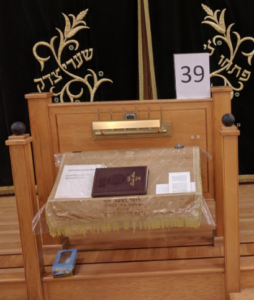It wasn’t meant to become a fixture. In fact, when our Sefirah counter first hit the top of the Chazzan’s shtender, it was intended as a message to the administration: “Please get an electronic Shul Board ASAP”. The issue was that mispallim couldn’t always hear the Rabbi’s counting of the Omer, so we needed a way to inform them of the current count. A well meaning member devised a solution consiting of a lucite stand and 49 plain white pages numbered from 1 to 49 in a 400pt Arial font.
It seemed a little silly at first. So low tech! It actually requires that the numbers be manually changed every day! So we looked for a high tech display board. But this one was too hard to read. And this one was too visually loud. And we couldn’t find the one which was just right. So the next year, and for many years after, we pulled out the lucite stand and the folder of numbers and we survived with our low tech solution. 
Not only did we survive, but the solution has actually thrived. It works quite well and we’re quite fond of it. A few falls has cracked the lucite base, but nobody is calling for a new one. It fits the character of the solution. We’ve even considered auctioning off the right to change the number. Another proposal was to have the numbers decorated by our play group.
But at the end of the day we’re purist, and we’ll continue with our simple and perfect low-tech solution to a common problem.
